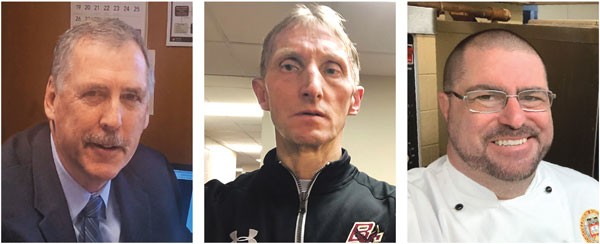
Res Life staff distributed moving boxes to students.
Photo: Edward Cullinane
Moving Out: An Oral History
How do you safely move more than seven thousand students off campus in four days, care for the hundreds of others who stayed behind, and do it all in the middle of a pandemic? The BC administrators who executed the plan explain how they pulled the whole thing off.
George Arey, Associate VP, Residential Life: Usually we start planning in March for the closing at the end of the academic year, so we have almost three months to prepare. In this case we had to build a process that allowed us to move more than 7,200 students off campus in ninety-six hours. Directly after Fr. Leahy’s email announcing that campus would be closing, we worked with the facilities department, dining services, and the police department to create that plan.
Daniel Bourque, VP, Facilities Management: Fr. Leahy’s email came out on a Wednesday and the students had until Sunday at 9 p.m. to move out. We worked very closely with the Residential Life team in terms of emptying out the residence halls. We had a trusted vendor come in to help with the moving and packing and storing of students’ belongings.
William B. Evans, BC Chief of Police: We put additional officers out there throughout the next ninety-six hours from the president’s email. We worked closely with students and parents to help them and their parents come in, get their stuff, and slowly move out of their rooms.
Arey: Not all the students were leaving, though, so we also had to plan for them. How are we supporting them, how can we keep them safe? And what are the logistics around moving them all into one part of campus so we can make sure that we can provide staffing, security, and access to dining services?

FROM LEFT: Daniel Bourque, William B. Evans, and Frank Bailey.
Bourque: It wasn’t clear early on the number of students who would be staying. At one point we thought it was close to eight hundred.
Arey: We received more than eight hundred appeals from students wanting to stay. The nature of the appeals ranged from personal health issues and financial situations to inability to get back to their home countries. We had to figure out how to manage who got to stay and who didn’t. We set up a committee with Res Life and different units in Student Affairs, including the vice president’s office, and that committee reviewed every appeal twice.
Bourque: As it turned out, we ended up with about 450 students who were staying, and that number eventually dwindled down to just below three hundred as some returned home.
Arey: While all of this was going on, housekeeping cleaned about 1,900 spaces in three days for these students. They always do a great job of cleaning, but this was really, really deep cleaning to make sure everything was sanitized for all of our students. They worked three shifts—a normal day shift, an evening shift, and an overnight shift—to get everything done.
Bourque: We focused on cleaning the upper campus residence halls first, because that’s where the students remaining on campus would stay. The other focus was the new residence hall, Thomas More, because that would be our isolation and quarantine location if needed. Once those areas were stable, we went back and started clearing and cleaning all the other residence halls. Housekeeping, custodial, our tradespeople—their dedication, commitment, and care has been incredible in supporting the University and, first and foremost, our students.

Facilities Services staff deep-cleaned residential spaces after the students moved out. Photo: Gerard Boyle
Arey: The students were spread throughout all the upper campus buildings so we could have a maximum amount of social distancing, and so that we could have the maximum amount of cleaning of bathrooms and common areas.
Frank Bailey, BC Executive Chef: We came up with various scenarios for feeding the students who remained on campus. We had written cycles [dining schedules and menus] in the event that we had a large number of quarantined students, or if our staff started getting sick, and we had even packaged and frozen five thousand meals just in case our entire dining staff went down. No matter what, we would have some way to feed the people who were here. We ended up going from serving twenty-four thousand meals a day during the typical semester to less than one thousand. People in the serving area had to remain six feet apart, so we had to really control the flow of students. It was so much quieter than usual, but it was also a little more stressful, because obviously we’re charged with making sure that when the students are in our care they’re as safe as possible. So we had one manager stand in front of the entrance and call people up. The students had to put away their phones, any headphones—things that could carry the virus. They sanitized their hands, and then we’d tell them which line to get into. We had two lines in order to maintain that six-foot space between people. It was almost like air-traffic control. Plexiglass separated our servers and the students, and we plated everything in to-go containers and then put it on a counter. Students walked by, grabbed their meal, and then headed off. Students who live here see our staff probably six days a week a couple times a day. So a lot of our staff have become familiar with the students. And to now have that separation, it was a bit of a struggle to remind people, “This is for their safety. You shouldn’t feel bad about it. You’re keeping them as safe as you can.”
Evans: The saddest part for me was being out there at 5 a.m. for their senior sunrise tradition on that last Sunday. We probably had more than two thousand kids for the sunrise, right on the Chestnut Hill Reservoir. They had to be out that night by nine. A sad, sad morning. It’s still sad. I would walk around the campus and it was heartbreaking to see it so still and so empty. No traffic. The football team wasn’t practicing. The baseball team…. What is usually a lot of enthusiasm and excitement was gone. It was like a ghost town. ◽


 print
print mail
mail
